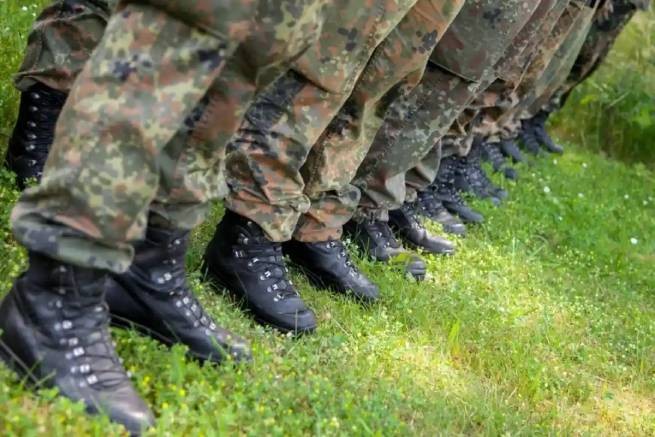The outbreak of a full-scale war in Ukraine forced Europe to pay close attention to its defense capabilities and revive compulsory military service.
How to assess the feasibility of such a step? Does conscription mean: sending ill-trained, unmotivated young men into battle, or is it able to stimulate civic duty and help protect Europe? Many Western countries have begun to question whether conscription is a solution to security concerns. There is no single answer here, and sometimes heated debates arise on this topic.
In August, Lithuania, like Denmark, announced plans to extend the conscription. British and German politicians have proposed to revive compulsory military service. But what consequences can its revival have for Europe? Will it prove counterproductive or help protect the region? Vincenzo Bove, conscription professor of political science at the University of Warwick, says, quotes euronews:
“The armed forces of Europe, especially those on the border with Russia, are now realizing that they do not have enough personnel. They clearly see the conscription as a solution to this problem. Whether this is a good idea in terms of deterring a potential Russian invasion, we certainly do not we know.”
The expert points to the lack of data on the effectiveness of draft armies compared to regular troops. Due to the complexity of modern warfare, Beauvais doubts that recruits can be adequately trained in the use of advanced technology and tactics used today in a short time. He explains:
“Look what is happening in Russia now with conscripts. They are not highly motivated. Young people are forced to work. Most of them would rather do something else.”
The former Wagner mercenary told Euronews in July that while serving in Ukraine, one of his main duties was to ensure that Russian conscripts, who were “barely 21 years old”, did not run away, as they were very reluctant to fight.
In addition to the economic problems associated with the ineffectiveness of compulsory military service, Beauvais, with a touch of irony, also pointed out the ethical considerations associated with sending inexperienced civilians into battle:
“Three years is not enough to teach the basics of warfare. Even the use of basic weapons requires a lot of training. Some countries talk about three-month programs. That’s nothing. They won’t even learn how to salute.”
Lithuania, which borders Russia’s Kaliningrad region, has recently begun drafting a draft reform of the military conscription system that could enlist people living and studying abroad. One of the options for reform is the voluntary recruitment of recruits for monthly training camps every summer for three years. Theoretically, they should be ready for combat.
In addition to Lithuania, compulsory military service, in one form or another, now exists in Denmark, Norway, Sweden, Finland, Austria, Latvia, Greece and Estonia, along with the belligerents Ukraine and Russia.
Other experts, though with reservations, are in favor of the draft. Criticizing “performative acts” where “every man and woman is forced into the military,” Elizabeth Brau of the American Enterprise Institute said euronewsthat selective systems can “work really well”. She cited the example of “incredibly successful” Norway, where citizens are recruited en masse but only 30% to 50% are selected for military training:
“The best and brightest get into the army, and besides, being in the army is an asset on a recruit’s resume, and being selected is a sign of prestige.”
In 2015, Norway became the first European country to introduce compulsory military service for men and women. At the same time, professional military personnel, which form the basis of its defense, are still preserved in the country. Ms. Brau also warned about conscription:
“Troops must have significant skills. The Kremlin will not be intimidated by an ill-conceived conscription model, when young men and women sit idle in the barracks. Conscripted civilians can be used not only in defense. Ensuring the country’s security is not only about the armed forces “It’s public health, infrastructure protection, and health care. Young people can be drafted into the army when needed to help protect the country from crises and disasters. There are so many public problems that the state alone cannot solve.”
In France, a form of “soft” conscription was launched in 2019: young people are offered voluntary civil service. Macron has called his project a way to promote patriotism and social cohesion, though opponents say it is diverting funds to the broader education system. Some studies show that conscripts are more likely to face the problem of unemployment at the end of their service. In addition, there are doubts that the acquired skills can be transferred to other industries or even mastered.
One of the reasons why Europe resorts to military conscription is that the usual methods of recruiting into the army do not work. The German army, for example, is unable to recruit new soldiers, despite a massive initiative to strengthen it in the conditions of the war in Ukraine, which was announced in August by the country’s Ministry of Defense. Why exactly people do not want to serve is unclear.
Experts argue that the military cannot compete with the private sector on pay and conditions, and military service can sometimes be difficult and dangerous. But, according to Bovet, this statement cannot explain what is happening in the regions of Europe with high unemployment rates – southern Italy or Spain. There, civilians still do not want to serve. Perhaps civilians do not want to join the army because they do not share its “overarching goals and objectives.”
The devastating wars in Afghanistan and Iraq have left a “negative” attitude towards the army for a long time, and Beauvais doubts that allocating money to solve this problem can improve the draft. There are arguments in favor of the fact that conscription can increase patriotism and the readiness of the population to defend themselves against the aggressor. Elina Ryutta, chairman of the Finnish Conscripts Union, says:
“Conscription service in Finland has a long history and enjoys wide support in society. The Russian threat has always been known in Finland, so the war in Ukraine does not in itself change the situation with the conscription service, but rather emphasizes its expediency. The desire to defend the country among conscripts and everything population is now at an all-time high.”
A study by Bove and his colleagues Riccardo Di Leo and Marco Giani demonstrated that conscription can create a gap between people and their government. Bove says:
“Conscription makes people identify with the armed forces, but loyalty to them conflicts with loyalty to other democratic institutions, making people less trust in the authorities. If you are worried about the growing distance between the younger generations and the state, then conscription is – it’s not an option. It’s actually counterproductive.”







More Stories
The Minister of Health called the protesters "insignificant people, kafirs"
Gold Switzerland: “We are in the last 5 minutes of our financial system – the collapse of everything is approaching”
Union of Judges: “People’s courts were created against us with the loyal attitude of the government”